Ιανουάριος
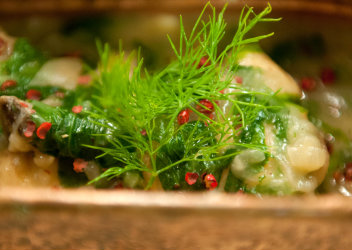
On the first day of the New Year the family cuts the vasilopita, which has a hidden coin in it. Whoever gets the coin in their slice of pie will have good luck in the coming year. The vasilopita with its intricate ornamental designs signifies the divine power of bread. The cutting of the vasilopita is a whole ritual which is carried out by the male head of the household. The main dish of the day varies from place to place. At the village of Vasilitsi the main dish is called tagiaprakia and consists of cabbage, pork and bulgur wheat. In other places in Messinia, like Methoni, Koroni and Messinian Mani, they prepare roast kid goat or pork with potatoes. At the village of Desyllas the traditional meal is free-range rooster with hilopites. At Koroni, the first plate of the meal is offered to a person in need to honor the deceased family members.
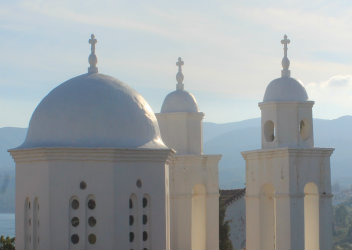
Epiphany is a big annual Christian religion celebration in commemoration of the baptism of Jesus Christ at the Jordan River by John the Baptist. The traditional dish of the day is pork with cabbage or wild greens. On this day, the wine barrels are blessed with holy water, opened and the first wine is tasted.
February
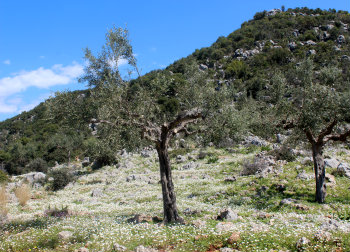
Saint Trifonas is considered the patron saint of vegetation, vegetables, agricultural prosperity and fields. He is also the patron saint of vineyards and wine growing. Saint Trifonas is often potrayed holding a grape. During the day of Saint Trifonas at the villages of Saidona in Mani and Neromylo in Pylos farmers refrain from all agricultural activities. Farmers also avoid pruning vineyards. Many farmers and wine growers go to church for Artoklasia (breaking of loaves service), to be blessed by holy water and to bring kollyva, an offering of boiled wheat.
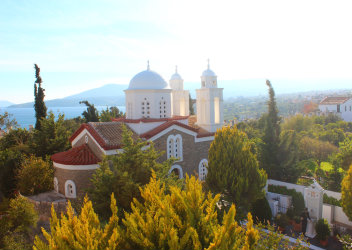
All Souls’ Days are days dedicated to the deceased. In Greece they are observed on a number of different Saturdays throughout the year and are called «Saturdays for Souls» or «Soul Saturdays». These occur on the Saturday before Meat Fare Sunday, the Saturday before Forgiveness (Cheesefare) Sunday and the Saturday of the first week of Lent. On Friday, the day before Soul Saturday, women bake Communion Bread which is stamped with a wooden seal and boil wheat grains to prepare kollyva, a special dish in honour of the dead. On Saturday morning the parishioners go to church with their prosphoron bread (bread of oblation) and a list with the names of their dead so that the priest can bless and commemorate them. The kollyva are offered to the parishioners. On Friday night, at the village of Marina at Ichalia, the children of the village go from door to door and are offered psychoudia (soul cakes), which are small bread buns in the size of the wooden seal of the prosphoron bread. Children are also offered feta cheese, walnuts and figs, almonds and lallagia.
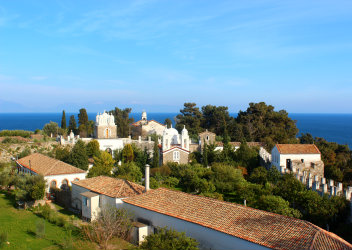
The Greek Orthodox Carnival (Apokries or Triodion) lasts three weeks. The first week is called Apolyti or Amolyti, signifying the ritual of shedding blood, that is, the ritual of every household slaughtering an animal. In the Peloponnese they used to slaughter pigs, which were bred for this exact purpose. The slaughtering of the pig was a ritual in which the entire village participated. At the village Konstantinoi as in other villages of Pylia, pigs were slaughtered from Monday to Thursday. Immediately after the slaughtering they would remove the trachea and grill it on open fire. This was the first mezes of the hog. They would drink a glass of wine and wish ‘kalofagoto’ – to eat well. From the hog they would make sausages, salted pork and a dish called omatia. Finally they would make tsigarides, that is, fried pork chunks. The next week was Meat fare week. The Thursday of this week is a special festivity day and it is called Tsiknopempti. All day rich and poor grill pork fat, meat and sausages. The slaughtering of pigs is a tradition in all the villages of Messinia. The third week is called Cheese fare week because the main ingredient of the dishes is cheese. It is also called Makaronou (spaghetti) week because of the large consumption of pasta dishes.
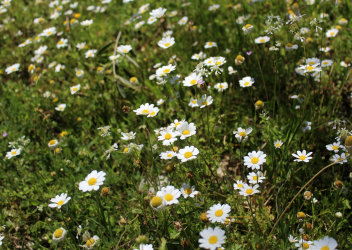
Ash or Clean Monday signifies the first day of Lent leading to Easter. It is called clean because on this day the housewives wash the kitchen pots and pans from grease and the 40 day lent period starts. According to tradition, on the eve of Clean Monday, the family places eggs on an open fire, one for each family member. If one of the eggs breaks, it means that the respective family member would hav a difficult year. If the egg remains intact, it signifies good health and luck. In most areas of Messinia on Clean Monday locals eat special dishes such as halvas, different types of pickles, dried nuts, loukoumia, spoon sweets and a lightly leavened bread, named lagana. At the villages of Vasilitisi in Pylos and Meropi in Messini locals eat various leafy greens like green garlic, spring onions and lettuce. They also eat table olives and legumes such as lupins and chickpeas. The celebration of Clean Monday is called Koulouma. On this day families go to the countryside, eat and fly kites.
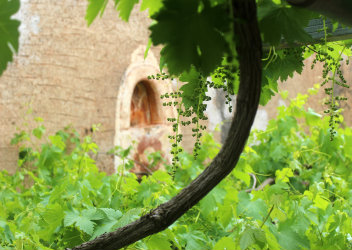
The name of the saint means much fruit in Greek. On Saint Polycarp day at the village of Meropi and the area of Mani, locals prune or at least cut one branch from their grape vines so they bear much fruit.
March
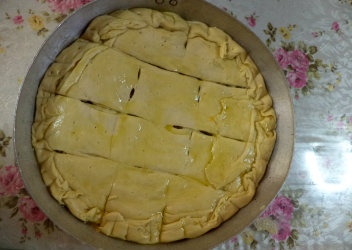
Saints Theodore Day is one of the most important days of the Lent period. It is celebrated on the first Saturday of Lent, which is also a Soul Saturday. On this day kollyva are offered in honour of the dead. In some areas of Messinia, such as Koroni, it is a tradition to make spinach or pumpkin pies.
April
May
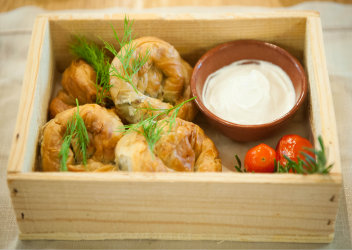
The Saturday of Pentecost is celebrated fifty days after Easter. It is also called Soul Saturday of May or Kneeling Saturday. At the village of Avlona in Trifyllia there is a custom which is called the Feast of Arousaliou. Combining the christian notion of resurrection with ancient belief on the temporary return of souls to the world, tradition declares that souls come back on the day of Christ’s resurrection and remain with us until the Pentecost. On this day, the locals go to the cemetery and farewell the deceased with a meal consisting of meat, bread, cheese and pies.
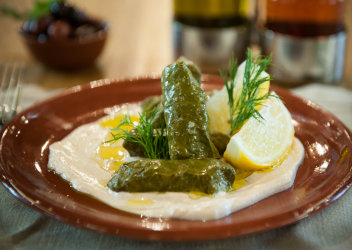
On this day it is traditional to make dolmades with cabbage or vine leaves, especially at Alagonia of Taygetos.
June
July
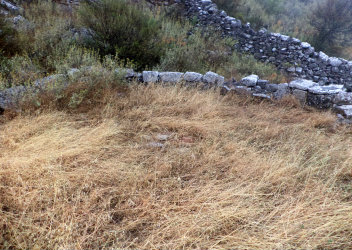
On this day no agricultural activites are allowed because otherwise, according to the tradition, Virgin Mary will burn the wheat sheaves of the threshing floors.
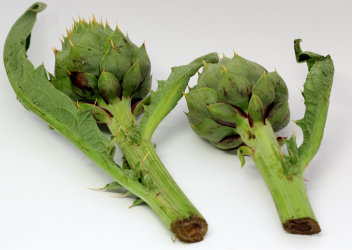
The Artichoke Festival has been taking place in mid July at the central square of Micromani Messinia every year since 1986. It is organized by the local cultural association under the auspices of the Municipality of Kalamata. The passion of the village women for the festival gives the visitors the opportunity to taste local delicious dishes based on artichokes, one of the main local agricultural products of the area.
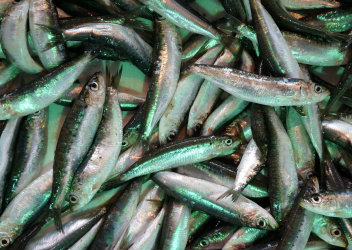
The Sardine Festival is celebrated in Agios Nikolaos of the Messinian Mani. The festivities take place at the port of the village and include grilling sardines, and traditional dancing and singing. The festival is organized by local cultural and trade associations in the context of the summer cultural events of the area, and in an effort to promote and preserve past customs and traditions.
August
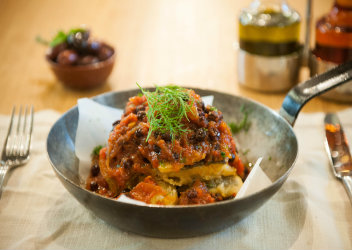
The Church celebrates the transfiguration or metamorphosis of Christ on Mount Tabor, when he appeared before the Apostles Peter, James, and John. The Lent period before the 15th of August permits the consumption of fish on this day. Main traditional dishes of the day include cod tsiliadia and baked salted cod with tomato sauce. At the village of Vasilitsi of Pylos, the locals place a crate of grapes in front of the altar of the church to be blessed by the priest. They then eat these blessed grapes before any other food. This tradition has its roots in antiquity.
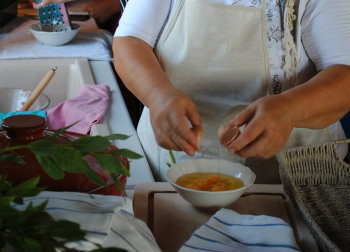
Saint Phanourios is commemorated on the 27th of August. He is the saint that we ask to intercede for us when we lose things. He is honoured by the faithful through a symbolic cake, called the "Phanouropita" which can be brought to the church, at any time, for a blessing.
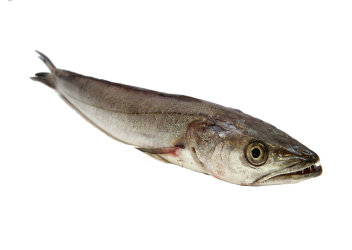
The Codfish Festival takes place in the village of Spilia of the Municipality of Kyparissia every year. Around the drinking fountain of Skandalis, the locals offer to visitors free cod and wine in order to promote their product.
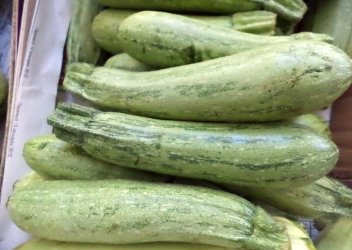
The Pumpkin Festival in Pelekanada Messinia is organized by the local women’s association. The festival promotes this local agricultural product and visitors have the opportunity to taste a great number of delicacies and traditional dishes. At the same time and in the context of the festival, a workshop on the rational management of pumpkin cultivation and its role in the Mediterranean diet and Messinian gastronomy is organized.
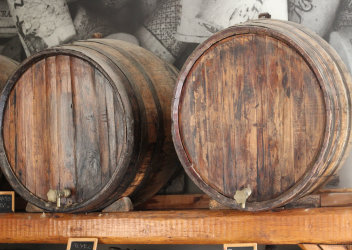
The Wine Festival is an annual landmark festival for many areas in Messinia. The festival is meant to acquaint visitors with the local traditional wine and to highlight its uniqueness in taste and good quality. Very popular are the festivities that take place in Chora of the Municipality of Nestora, which are part of the «Nestoria» cultural activities during the first fortnight of August. Wine is also celebrated in Perdikoneri of the Municipality of Kyparissia and in Petritsi of the Municipality of Voufrada on 10 August every year. Free wine is offered by local producers and mezedes based on the Messinian diet by the local housewives. The festivities are accompanied by live music and traditional dancing and singing.
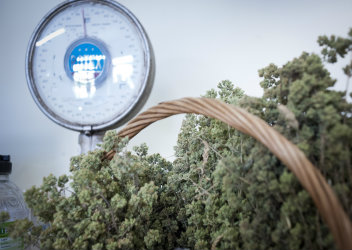
The Oregano Festival takes place every year in mid August in the picturesque village of Stasi of the Municipality of Kyparissia, known for its olive oil, wine and oregano, which is abundant in the area. Free chicken with oregano, oregano fritters, and the traditional riganada, that is, rusks with oregano, tomato, and feta dipped in olive oil, are offered during the festival.

The Sardine Festival takes place in the fish village of Marathopolis Messinia. It is organized by the local women’s association and the Municipality of Trifyllia to promote the product. During the festival, visitors are offered grilled sardines, bread, salad and wine.
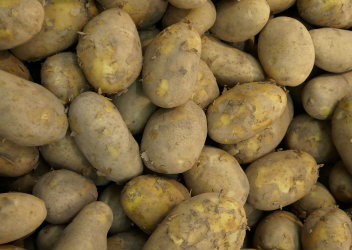
The Potato Festival has been held every year since 1984 at the end of August in the central square of the village of Alagonia. It is organized by the local cultural association and its purpose is to strengthen the potato seed centre of the area. The centre was set up in Alagonia in 1973 and supplies the lowlands of Messinia with potato seeds. In the last few years, at the end of July, a Potato Festival is also organized in Messini by the local women’s associations and the Municipality of Messini. Potatoes are prepared on open fires at the town square so the visitors have the opportunity to attend. Local women cook potatoes in various ways (roast, boiled, skordalia (potato and garlic mash), potato mash, with codfish and so on) and offer these dishes free to visitors. After everyone tastes the potato dishes, they enjoy folk music and local songs.
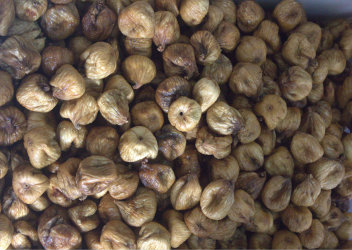
The Fig Festival has been organized on the 17th and 18th of August in Polylofos Messinia by the local cultural association since 2002. The festival is dedicated to the cultivation and products of the fig tree, which is one of the main sources of income for the area. The purpose of the festival is to promote the many values of the fig and the role of the fig producers through scientific presentations and documentaries. It also aims to promote fig trade at a national and international level. During the fig festival visitors have the opportunity to taste fig sweets.
September
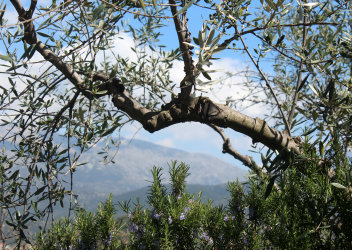
The Elevation of the Life-giving Cross is the most important religious day in September. On this day, the church offers sweet basil because, according to the tradition, Saint Helen found the Life-Giving Cross of Christ under a mound where sweet basil was growing. With the sweet basil and the holy water of the day, the local women make the new starter dough. Once the starter dough is ready, they place the sweet basil on the top and let it rest for a day. The first bread they knead with this starter dough will be prosphoron bread (bread of oblation), stamped with the religious wooden stamp. At church it is offered to the parishioners. This tradition takes place in many areas of Messinia, such as Mani, Koroni and Desylla. In the area of Mani, especially at Avia, the locals take a bowl of all types of grains to the church to be blessed.
October
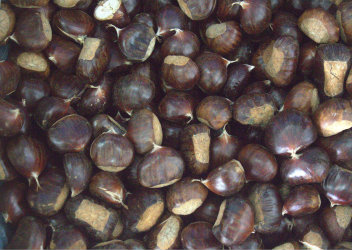
The Chestnut Festival is held annually in the village of Ambeliona, near Neda River, initiated by the Association of Abeliona, local authorities and the Municipality of Ichalia. Free roasted chestnuts, and an abundance of food and wine are offered during the festival in order to promote and highlight the local product. In recent years, the celebration also takes place in the village of Kastania of West Mani, on the second Sunday in October, by the local association "The Assumption of the Virgin". Local products and dishes are offered, such as roasted pork (gournopoula), bean soup, traditional bread, wine, tsipouro and roasted chestnuts.
November
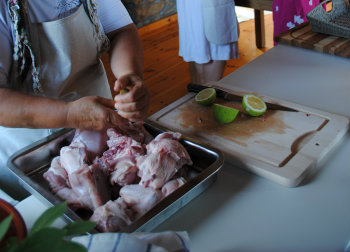
Saint Phillip day is the last day during which we eat meat before the lent period of Christmas begins. According to the religious history, Saint Philip slaughtered a ox to feed his family, not having any other food. When they asked him how his family would survive, he asked God for help. The next day, he found the ox that he had slaughtered alive in the stable.
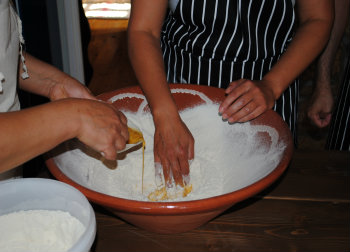
Saint Stylianos is commemorated on the 26 November and is the patron of children. For this reason, in many areas of Messinia the women make biscuits in the shape of children.
December
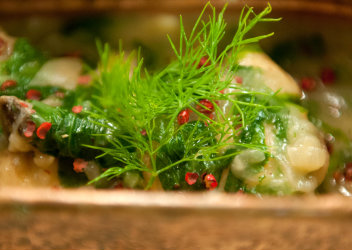
Christmas table is regarded with the utmost reverence and a day which we have to remember the poor. For this reason, the first piece of the christmas bread (tsoureki) is offered to a beggar.
The main bread of Christmas is the Christopsomo and the Christokoulouro, a special bread decorated with religious symbols.The Christopsomo is the prosforon bread of the day because it is decorated with the sign of the cross and stamped in the center with the seal. There is a walnut at each of the four corners of the bread and its surface is sprinkled with almonds and sesame seeds. On Christmas day, families would offer Christmas breads to their godchildren, relatives, friends and neighbors. If the household could afford it, they would offer gift baskets containing besides the Christmas bread, sweets such as diples, kourambiedes and melomakarona. A small Christmas bread took its place at the home iconostasis, an offering to young Jesus and would remain there until the following Christmas. On the dawn of Christmas day they also prepared lalaggia. The first one had the shape of a cross and was placed at the family iconstasis as well while the rest were given to neighbours or poorer people as a symbolic act of love.
At most Christmas meals in Messinia the main meat dish is pork fricassee with vegetables (pork fricassee with celery) and less commonly goat fricassee with wild greens. Christmas sweets included kourambiedes and melomakarona. At the village of Desyllas they also made baclavas. The crumbs and food leftovers from the Christmas meal were considered sacred. For this reason, they gathered them in a bag and scattered them at their fields to help the fruit production of trees (lemon, orange and apple trees).